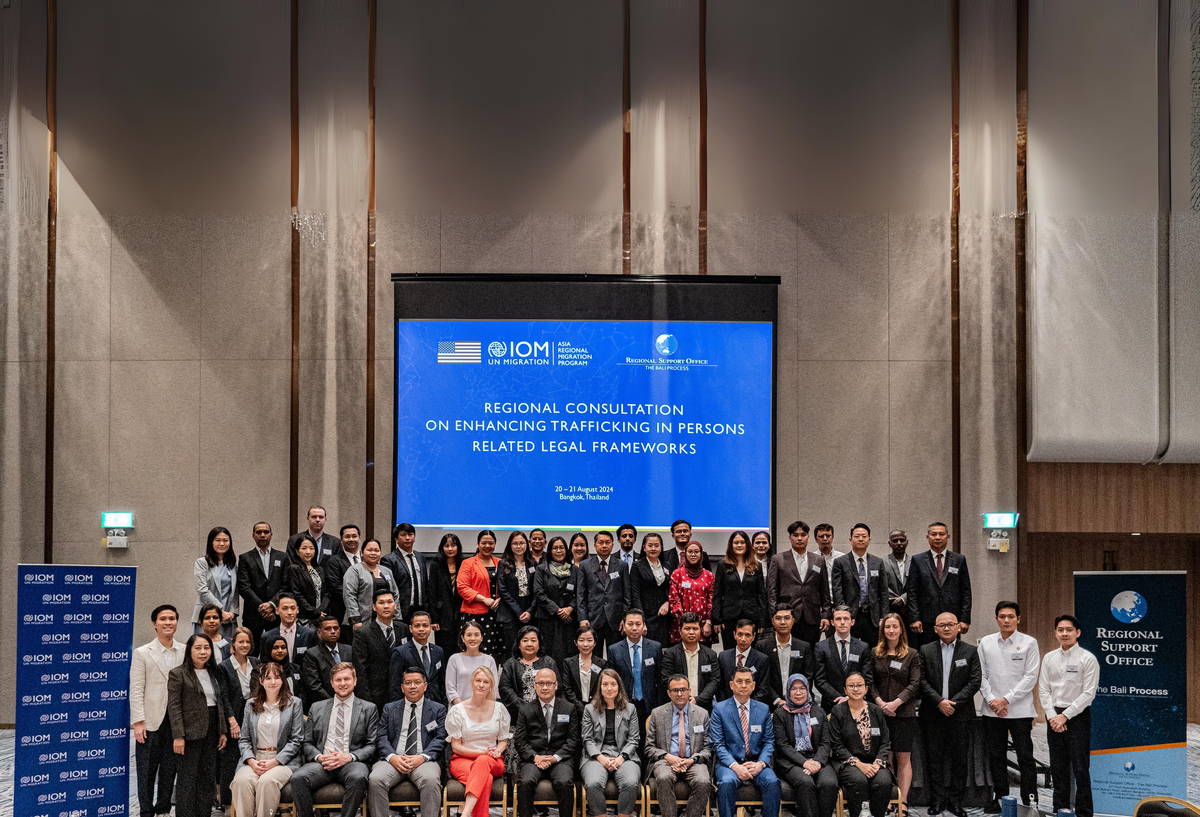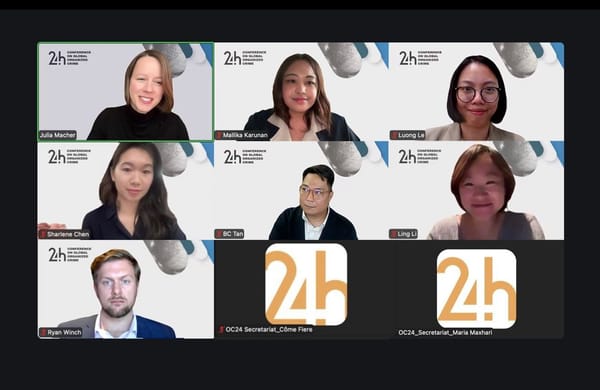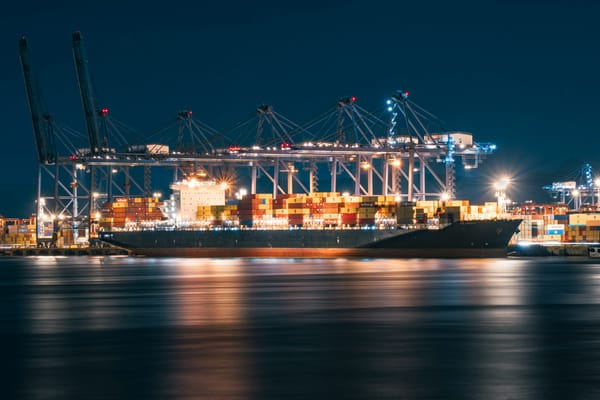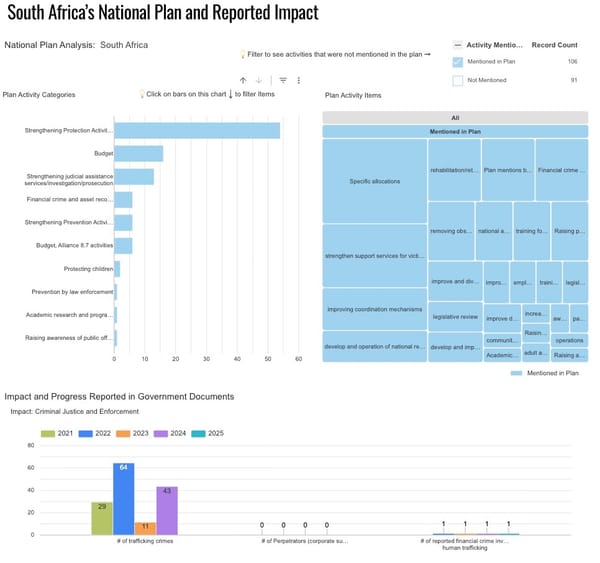The application of trafficking legislation must be refined to address emerging forms of exploitation

IOM and RSO consult on existing legal frameworks in relation to emerging forms of trafficking, Brazil launches a new counter-TIP action plan, and trafficking for sexual exploitation rises 30 per cent in Mexico.
Discussions at a recent workshop hosted by the International Organization for Migration (IOM) Thailand and the Regional Support Office of the Bali Process (RSO) in Bangkok concluded that the application of existing trafficking laws must be improved to better distinguish between victims and perpetrators in cases involving forced criminality. A fairer balance of protection and accountability is needed, participants said, highlighting the increasingly blurred lines between victims of exploitation and perpetrators.
The Regional Consultation on Enhancing Trafficking in Persons Related Legal Frameworks, part of an ongoing assessment of the national policies and legislative architecture related to trafficking in persons across Bali Process Member States, gave members the opportunity to explore key themes, including the linkages between gender and trafficking in persons, the impact of emerging technologies, and how definitions of trafficking diverge or converge across South and Southeast Asia. The two-day workshop brought together around 50 experts and practitioners from select South and Southeast Asian countries, including representatives from justice ministries, law enforcement, immigration officials, and agencies mandated to provide victim protection and assistance.
Conversations during the event highlighted that in countries where trafficking for forced criminality is prevalent, the existing application of laws often fails to distinguish between coerced victims and willing perpetrators, leading to inconsistent outcomes in victim protection and justice. As also noted in an article published last week by the Global Initiative Against Transnational Organized Crime (GI-TOC), the term “victim-centered” is extremely difficult to implement in the real world, where cases are often nuanced and the concepts of right and wrong are blurred.
In places where organized crime interests build infrastructure, boost local economies, and create opportunities, desperate people can become trapped in criminal operations that have a veneer of legitimacy – initially deceived, then threatened and even tortured into committing crimes. In Indonesia, for example, Muslim workers recruited and then trafficked into scam centers for jobs connected with online gambling – which, while generally discouraged in Islam, is sometimes accepted as a means of making a living – are often thought responsible for their situation because they chose a “morally questionable” job. This mirrors the stigma faced by those exploited in the commercial sex industry, where victims are frequently blamed for their exploitation due to societal and cultural biases. It is also consistent with reports from Freedom Collaborative’s civil society partners that, when survivors are interviewed by law enforcement, the first question often asked is, “What scam did you do?”, suggesting they are already perceived as criminals. This failure to recognize and protect victims or uphold the non-punishment principle can deter victims from coming forward or cooperating in investigations.
Focus should therefore be on a dual approach that strengthens victim protections and ensures that prosecutions are fair and targeted at the true perpetrators. To lower the bar for victim protection, stakeholders should broaden victim definitions and recognize individuals coerced into criminal activities as victims, even if they appear as offenders; improve identification tools and develop more sensitive screening methods that consider the broader context of a person’s involvement in crime; and apply the non-punishment principle, ensuring victims are not prosecuted for crimes they were forced to commit, with legal protections explicitly in place. To raise the bar for prosecution, they should ensure prosecutors provide clear evidence that a person willingly participated in a crime, without coercion or deception; and target traffickers, focusing on prosecuting those who orchestrate and profit from trafficking, rather than on victims coerced into criminal activities.
Creating a legal environment that balances protection with accountability through improving legal and investigative practices, including ensuring that screening tools used to identify victims interact with the investigative techniques used to identify perpetrators, would help ensure that the nuanced realities of trafficking cases are better understood, allowing for fairer and more informed legal outcomes.
Here’s a round-up of other noteworthy news and initiatives:
Brazil has launched its IV National Action Plan to Combat Trafficking in Persons, a strategic blueprint that will guide the government’s response over the next four years, addressing emerging challenges such as the trafficking of children for illegal adoption and technology-facilitated trafficking. The document outlines 26 priority actions across 107 activities, focusing on areas such as strengthening the response to forced labour and improving intelligence centers dedicated to human trafficking investigations.
EU legislative and regulatory measures on social rights, risk assessments and external audits, already in place or still to come, are poised to threaten the giants of Chinese online commerce, including Shein. The fast-fashion retail platform has been under fire for using forced labour in China’s Xinjiang region, which it denies, and is also currently the target of French lawmakers’ efforts to rein in fast-fashion companies under a new environmental law.
Fishermen rescued from a UK vessel are bringing a Human Rights Act claim against the Home Office, saying it breached their rights by failing to protect them from human trafficking, modern slavery and forced labour, or identify them as being at risk. According to the men’s lawyers, reports show how migrant seamen on transit visas are in a position of vulnerability because they have no lawful immigration status or statutory employment rights, and how vessel owners rely on this to exploit them.
Mexican CSO La Brigada Callejera, a member of the Global Alliance Against Traffic in Women (GAATW), has highlighted a concerning 30 per cent rise in trafficking for sexual exploitation in the country, primarily impacting undocumented migrant women from Venezuela. Mexico must now address root causes such as poverty and lack of opportunities, says GAATW, and support sex workers in order to help identify trafficking victims, emphasizing that legislation alone is not enough.
Thousands of Nigerian women and girls, some as young as 13, are being trafficked to towns and cities in Ivory Coast by agents taking advantage of record unemployment in Nigeria. Recruiting agents go into rural communities or post in jobseekers’ groups on Facebook with promises of legitimate-sounding work, before passing recruits to other agents who guide them across porous borders, gaining access by paying bribes. Trafficking is criminalized in Ivory Coast but the law is barely enforced, critics say.
The Netherlands’ National Rapporteur on Human Trafficking has warned that the closure of the national registration point for Ukrainians in Utrecht, which provided temporary accommodation, has left refugees vulnerable to human trafficking and exploitation, saying that municipalities should invest in the long-term reception of asylum seekers. The number of Ukrainian trafficking victims in the Netherlands has risen alarmingly in the past year.
The Anti-Slavery Collective has launched a collection of cybersecurity awareness training resources that aim to equip survivors of modern slavery and human trafficking with the skills to stay safe online. The resources include a training webinar to help frontline workers support survivors, a guidebook for survivors containing practical advice and tips, and video guidance on achieving a safer online presence.




